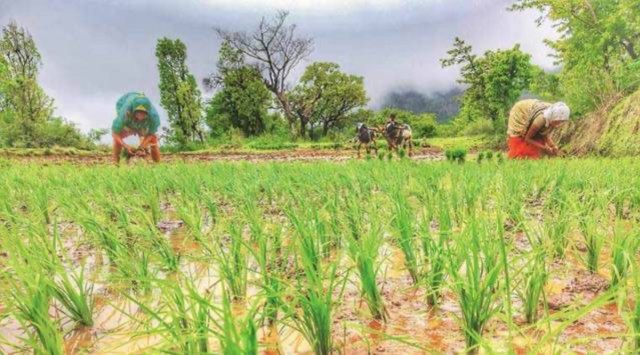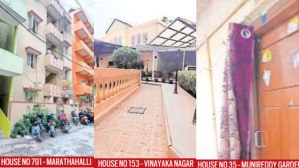Stay updated with the latest - Click here to follow us on Instagram
This year, Punjab fails to achieve even 1/10th target under DSR
According to the Department of Agriculture, the field reports collected from all the districts of the state showed that Punjab has managed to bring only 33,517 acre of land under DSR till June 12, and the recommended period for implementing this technique is till the first half of June.
 With DSR, which is also known as T-DSR or Tar-wattar Direct Seeding of Rice, 15 to 20 per cent water saving is expected in paddy cultivation. (Representational image)
With DSR, which is also known as T-DSR or Tar-wattar Direct Seeding of Rice, 15 to 20 per cent water saving is expected in paddy cultivation. (Representational image) While Punjab had set a target of bringing around five lakh acre of land under the ‘Direct Sowing of Rice (DSR)’ technique this year, the state has failed to achieve even one-tenth of the target so far. This is concerning as the ideal period for implementing DSR in the state is coming to an end. Last year, only 1.71 lakh acre of land was cultivated using DSR in Punjab.
According to the Department of Agriculture, the field reports collected from all the districts of the state showed that Punjab has managed to bring only 33,517 acre of land under DSR till June 12, and the recommended period for implementing this technique is till the first half of June.
With DSR, which is also known as T-DSR or Tar-wattar Direct Seeding of Rice, 15 to 20 per cent water saving is expected in paddy cultivation.
Even though five lakh acres may not seem like a large target, considering the total area cultivated with water-guzzling paddy in Punjab, which is 75 lakh acre, the state is still falling behind.
Every year, Punjab records over 30 lakh hectare (around 75 lakh acre) cultivation under paddy, including approximately 4 to 5 lakh hectare of Basmati rice and the remaining 25 to 26 lakh hectares of non-Basmati paddy.
Muktsar Sahib has recorded the highest area with 9,966 acres cultivated till June 12 under DSR. Fazilka follows with 7,687 acre, and Bathinda is in third place with 2,840 acre cultivation. Among the lowest area under DSR, Fatehgarh Sahib is at the bottom with only 55 acre. Ropar records 57.58 acre, and in Pathankot only around 80 acre was cultivated.
Other districts have recorded the following DSR areas: Ferozepur -2,238.75 acres, Amritsar -2238.64 acres, Ludhiana – 1458.46 acre, Patiala – 1187.44 acre, Faridkot – 897.38 acre, Mansa – 891.37 acre, Sangrur – 758.88 acre, Tarn Taran – 670 acre, Barnala – 526.52 acre, Gurdaspur – 522.54 acre, Mohali – 298 acre, Moga – 291.78 acre, Kapurthala – 289.54 acre, Nawanshahr – 239.67 acre, Jalandhar – 170.57 acre, and Hoshiarpur – 151.67 acre.
So far, 3,400 farmers have registered for DSR. In Fazilka, 791 farmers are registered, followed by Amritsar with 755, Bathinda with 353, Ferozpur and Ludhiana with 158 each, Patiala with 163, and Sangrur with 112. Less than a hundred farmers each in the remaining 11 districts have adopted DSR. Fatehgarh Sahib and Rup nagar districts recorded the lowest number of farmers under DSR with 10 and 11 farmers respectively.
Experts have stated that DSR can withstand light rain but not heavy rainfall, which the state experienced in the latter half of May and the first week of June.
The government selected 16 blocks in Punjab for the pilot project of Tar-wattar Direct Seeding of Rice (T-DSR) this year. These blocks include Sunam in Sangrur, Barnala in Barnala, Moga-1 in Moga, Patiala, Bassi Pathana in Fatehgarh Sahib, Sultanpur Lodhi in Kapurthala, Phool in Bathinda, Raikot/ Machhiwara in Ludhiana, Mansa, Patti in Tarn Taran, Ajnala in Amritsar, Kotakpura in Faridkot, Ghal Khurd Zira in Ferozepur, and Fazilka.
In T-DSR, farmers give a rauni (pre-sowing) irrigation and wait for four-five days till the field has ‘tar-wattar’ or sufficient workable soil moisture. They then sow paddy with DSR machine. Post this, farmers are supposed to apply a first post-sowing irrigation after 21 days. But this year farmers could not get three weeks time without rain.
Gurvinder Singh, director, Department of Agriculture Punjab said that due to pre-monsoon heavy rains, the weather was not favourable for DSR technique this year. He said that still the sowing is on and the final figure will show the actual results.







